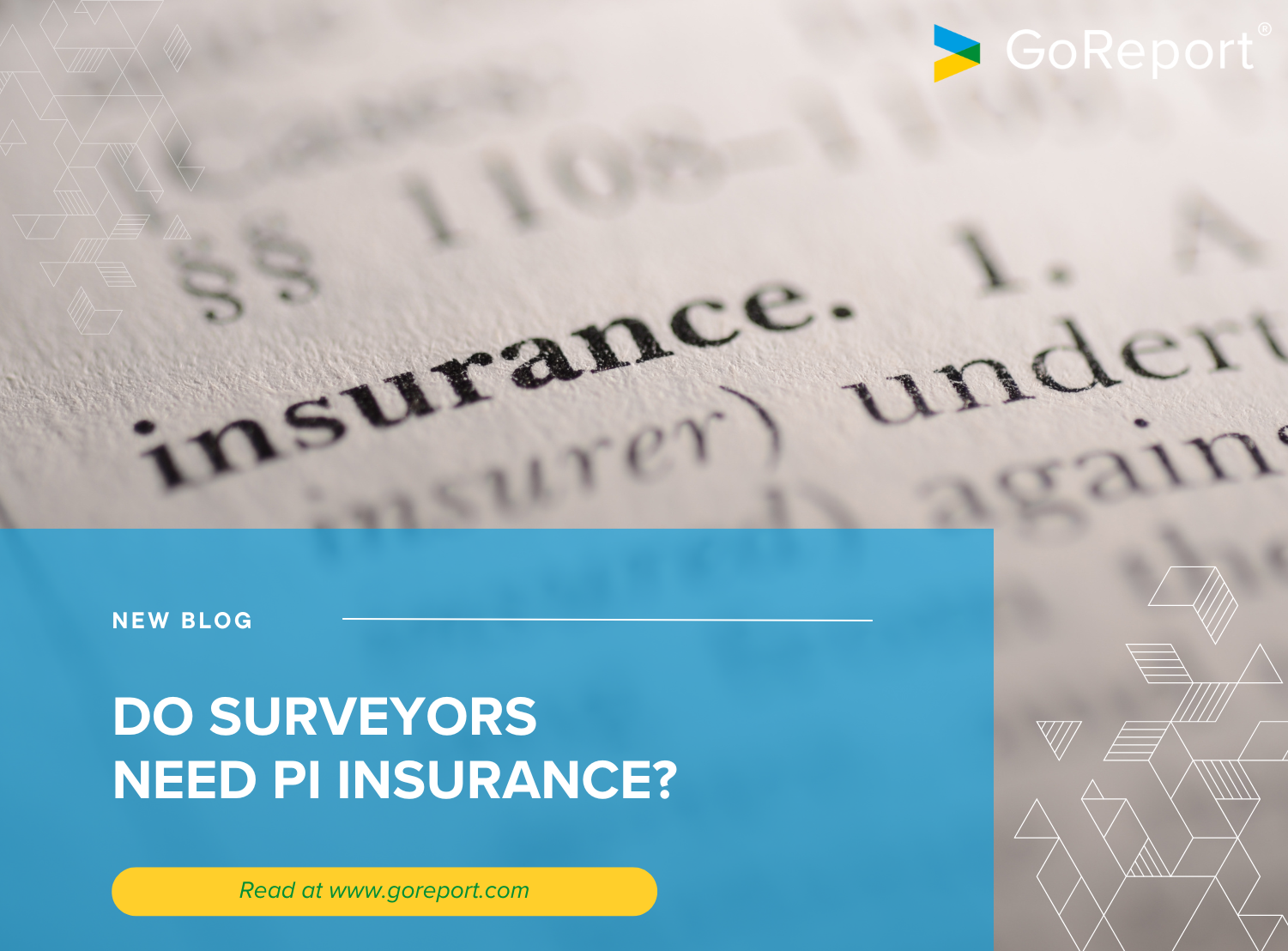Do Surveyors Need PI Insurance? | Professional Indemnity Guide

If you’ve ever asked yourself whether PI insurance is worth the cost, you’re not alone. Professional indemnity insurance has a reputation for being both essential and ever so slightly confusing. For surveyors, the question isn’t really “should I have PI insurance?” but rather “what happens if I don’t?”
This article clears up what PI insurance is, why it matters for surveyors, and how it ties into everyday practice. We’ll also cover what it does and doesn’t protect you from, the costs involved, and where the industry is heading.
Contexts Covered
-
What is PI insurance?
-
Do surveyors legally need PI insurance?
-
Why PI insurance is so important for surveyors
-
What PI insurance actually covers
-
Common exclusions (what it doesn’t cover)
-
How much does PI insurance cost surveyors?
-
Factors that affect your premiums
-
Alternatives and risk management strategies
-
How PI insurance links to technology and compliance
-
FAQs
What is PI Insurance?
PI insurance, or professional indemnity insurance, protects surveyors against claims of negligence, mistakes, or professional errors. In simple terms, it covers you if a client believes your work has caused them a financial loss.
For surveyors, this usually means situations such as:
-
Missing a structural defect during a homebuyer’s survey
-
Providing inaccurate costings in a dilapidation report
-
Giving professional advice that later turns out to be incorrect
If a claim is made, PI insurance can pay for:
-
Legal defence costs
-
Compensation or settlement payments
-
The cost of rectifying mistakes, depending on the policy
Without PI insurance, surveyors could be personally liable for these expenses, which can easily run into tens of thousands of pounds. That’s why most professional bodies, including RICS, make PI insurance a requirement for practising members.
In short, PI insurance for surveyors is a safeguard: it ensures that if something does go wrong, your career and business aren’t left on the line.
Do Surveyors Legally Need PI Insurance?
Here’s the simple answer: yes, most surveyors need PI insurance.
In the UK and Ireland, if you’re a member of RICS or a professional body, you’re required to hold it. In the US, requirements vary by state and by employer. Even if you’re not strictly required to have it, you’ll often find that clients won’t work with you unless you do.
So while it may not always be a legal requirement, it’s very much a commercial one. Without PI insurance, you may struggle to secure contracts, especially larger ones.
Why PI Insurance is So Important for Surveyors
Surveying is a profession where a small oversight can cause a big financial ripple. For example:
-
Missing a structural defect in a homebuyer’s survey
-
Underestimating costs in a dilapidation report
-
Giving advice on a commercial lease that later proves incorrect
Any of these could lead to a claim. And those claims don’t just mean stress—they can be eye-wateringly expensive.
PI insurance is there to:
-
Cover legal fees if a claim is made against you
-
Pay compensation if you’re found liable
-
Protect your reputation by showing clients you take responsibility seriously
Without insurance, you could be personally liable.
What Does PI Insurance Cover for Surveyors?
Coverage varies depending on your policy, but common inclusions are:
-
Negligence – failing to spot a defect or giving incorrect advice
-
Errors or omissions – mistakes in reporting or leaving key details out
-
Breach of duty – not meeting professional obligations
-
Defamation – if something written in a report is deemed damaging
-
Loss of documents – misplacing or losing client records
It’s worth noting that PI insurance doesn’t just cover payouts. Legal defence costs are included too, which can quickly run into thousands even if you win the case.
What Doesn’t PI Insurance Cover?
This is where people get caught out. PI insurance isn’t a blanket protection. Most policies exclude:
-
Fraud or deliberate dishonesty
-
Bodily injury or property damage (that’s covered by public liability insurance)
-
Known claims before the policy start date
-
Contractual penalties (e.g., fines in contracts)
-
General wear and tear disputes
Understanding exclusions is key. Too many surveyors assume PI insurance covers everything, then find out the hard way it doesn’t.
How Much Does PI Insurance Cost Surveyors?
Costs depend on several factors. For some, it’s a manageable business expense; for others, premiums feel like a second mortgage. Typical influences include:
-
Turnover and project size – the bigger the projects, the higher the risk
-
Services offered – residential surveys may carry less risk than complex commercial advice
-
Claims history – if you’ve had claims before, expect higher costs
-
Level of cover – policies can range from £100k to £10m+
-
Location – regulatory requirements differ in the UK, Ireland, and US
On average, small survey practices might pay a few thousand pounds a year. Large firms can pay tens of thousands.
Alternatives and Risk Management
You can’t really “replace” PI insurance, but you can reduce the chance you’ll need it. That starts with good processes and tools.
-
Clear terms of engagement – make sure clients understand what your report includes (and what it doesn’t)
-
Use technology – digital data capture reduces mistakes and improves accuracy
-
Stay compliant – regulatory compliance isn’t optional; it’s part of being professional
-
Team training – make sure everyone in your firm works to the same high standard
These don’t replace PI insurance, but they show clients you’re serious about risk management and may even help keep premiums down.
PI Insurance and Technology
Here’s an interesting thought: many claims arise from simple reporting errors. A number missed, a typo, a missed photo. With digital surveying tools, you cut down on manual errors and improve consistency.
Platforms like GoReport’s digital data capture allow surveyors to record data on site and produce reports with greater accuracy and speed. Not only does this save time, it can also reduce the risk of claims. Surveyors who want to scale smarter, not just bigger already see the link between technology and risk.
PI insurance is essential, but combining it with the right surveying tools gives you a much stronger defence.
The Bottom Line on PI Insurance for Surveyors
Yes. Even if you’re small, even if you’ve never had a claim, even if you trust your processes, PI insurance is essential. It protects your livelihood, builds trust with clients, and ensures you can keep working without the constant fear of a single mistake ending your career.
While insurance is about protection, prevention matters too. Using modern surveying tools and apps is a smart way to show you’re professional, careful, and client-focused. If you want to take the pressure off reporting and reduce your risk of errors, book a free demo with GoReport today.
FAQs: PI Insurance for Surveyors
Do surveyors need PI insurance by law?
In the UK and Ireland, yes if you’re RICS-regulated. In the US, it varies by state. Even when it’s not legally required, most clients will demand it.
What level of PI insurance cover should surveyors have?
This depends on the size of your projects. Many small practices carry £250k–£500k, while larger firms often need £1m+.
Does PI insurance cover surveyors for missed defects?
Yes, if it’s a genuine oversight or error, but deliberate dishonesty is not covered.
How can surveyors reduce PI insurance premiums?
Maintain a clean claims record, use digital reporting tools to reduce errors, and clearly set client expectations in contracts.
Is PI insurance the same as public liability insurance?
No. Public liability covers injury or property damage. PI covers negligence, errors, and omissions in your professional work.








